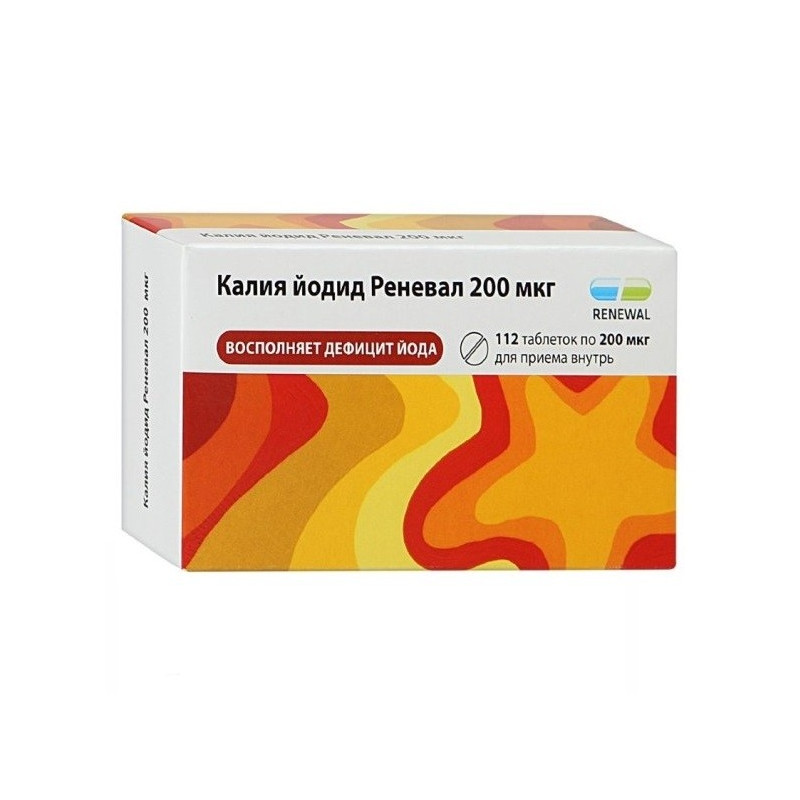



 All payments are encrypted via SSL
All payments are encrypted via SSL
 Full Refund if you haven't received your order
Full Refund if you haven't received your order
Means containing inorganic Iodine. When iodides enter the epithelium of the follicle of the thyroid gland under the influence of the enzyme iodide peroxidase, iodine is oxidized to form elemental iodine, which is incorporated into the tyrosine molecule. In this case, one part of the tyrosine radicals in thyroglobulin is iodized. Iodinated tyrosine radicals are condensed into thyronines, the main of which are thyroxin (T4) and triiodothyronine (T3). The resulting complex of thyronin and thyroglobulin is released as a deposited form of thyroid hormone into the follicle colloid and remains in this state for several days or weeks. With iodine deficiency, this process is disturbed. Potassium iodide, compensating for iodine deficiency, helps to restore the disturbed synthesis of thyroid hormones.
Under normal conditions of iodine in the environment, under the influence of an excess of iodides, the biosynthesis of thyroid hormones is inhibited, their release from thyroglobulin decreases, the thyroid gland's sensitivity to the thyroid stimulating hormone of the pituitary gland decreases and its secretion by the pituitary gland is blocked.
When ingestion is rapidly absorbed from the gastrointestinal tract. Widely distributed in all tissues and body fluids.
Prevention and treatment of endemic goiter. Prevention of relapse of goiter in the period of the complex treatment of thyroid hormone drugs.
Individual. The daily dose in terms of iodine for children is 50-100 mcg, for adolescents and adults - 100-200 mcg.
Manifestations of iodism: swelling of the nasal mucosa, urticaria, angioedema, eosinophilia, shock; tachycardia, irritability, sleep disturbances, increased sweating, diarrhea (in patients over 40 years old) are also possible; in some cases, when used in doses exceeding 300-1000 mcg / day, hyperthyroidism may develop (especially in elderly patients, in the presence of nodular or diffuse toxic goiter); with high-dose therapy (more than 1 mg / day), goiter-induced iodine and, accordingly, hypothyroidism can develop.
Severe hyperthyroidism, latent hyperthyroidism (when used in doses exceeding 150 mcg / day), toxic adenoma, nodal or diffuse toxic goiter (when used in doses of 300-1000 mcg / day), herpetiform dermatitis (Duhring's disease), pregnancy and breastfeeding (when used in doses of 1-2 mg / day.), hypersensitivity to iodine preparations.
In pregnancy, use is possible only in recommended doses, since iodine penetrates the placental barrier and can cause the development of hypothyroidism and goiter in the fetus.
Iodine is excreted in breast milk. When used in the mother during lactation (breastfeeding) in doses of more than 1 mg / day. there is a risk of hypothyroidism in an infant.
During therapy, patients with renal insufficiency may develop hyperkalemia.
During therapy, patients with renal insufficiency may develop hyperkalemia.
With simultaneous high-dose therapy with iodine and potassium-sparing diuretics, hyperkalemia may develop, with lithium preparations - the development of goiter and hypothyroidism. Perchlorate and thiocyanate competitively inhibit iodine uptake by the thyroid gland, and TSH stimulates.
Antithyroid drugs weaken the effect (mutually).
